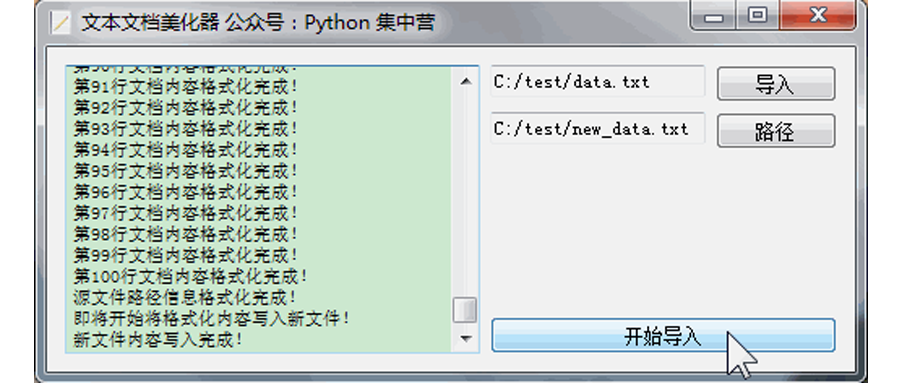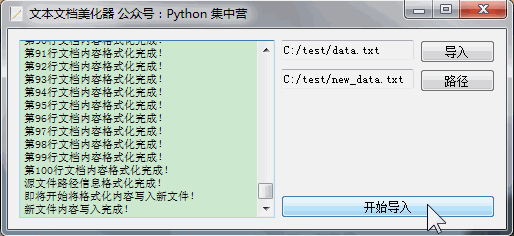热门标签
热门文章
- 1网络仿真软件性能比较_软件模拟mac层
- 2Java使用数组实现循环队列_java 数组实现循环队列
- 3史上最快的推理终端来啦!Groq API 新手入门指南
- 4hive MaxCompute ( 原odps) 常用函数_odps编写create sql function
- 5AI大模型探索之路-实战篇16:优化决策流程:Agent智能数据分析平台中Planning功能实践_agent planning
- 6【MySQL】数据库介绍|数据库分类|MySQL的基本结构|MySQL初步认识|SQL分类_mysql有哪两种数据库
- 7容器化部署 Jenkins,并配置SSH远程操作服务器_jenkins ssh
- 8Linux信号机制_linux中的信号机制
- 9程序员生存观察:为什么非要谈理想?我就想挣点钱_自动驾驶青春饭
- 10【KEIL5仿真】Keil5仿真配置_keil5下仿真
当前位置: article > 正文
我使用pangu模块做了一个文本格式化小工具!_自动化工具pangu
作者:码创造者 | 2024-06-20 11:04:35
赞
踩
自动化工具pangu
其实使用pangu做文本格式标准化的业务代码在之前就实现了,主要能够将中文文本文档中的文字、标点符号等进行标准化。
但是为了方便起来我们这里使用了Qt5将其做成了一个可以操作的页面应用,这样不熟悉python的朋友就可以不用写代码直接双击运行使用就OK了。

为了使文本格式的美化过程不影响主线程的使用,特地采用QThread子线程来专门的运行文本文档美化的业务过程,接下来还是采用pip的方式将所有需要的非标准模块安装一下。
pip install -i https://pypi.tuna.tsinghua.edu.cn/simple pangu
pip install -i https://pypi.tuna.tsinghua.edu.cn/simple PyQt5- 1
- 2
将我们使用到的pyqt5应用制作模块以及业务模块pangu导入到我们的代码块中。
# It imports all the classes, attributes, and methods of the PyQt5.QtCore module into the global symbol table.
from PyQt5.QtCore import *
# It imports all the classes, attributes, and methods of the PyQt5.QtWidgets module into the global symbol table.
from PyQt5.QtWidgets import QApplication, QWidget, QHBoxLayout, QVBoxLayout, QTextBrowser, QLineEdit, QPushButton, \
QFormLayout, QFileDialog
# It imports all the classes, attributes, and methods of the PyQt5.QtGui module into the global symbol table.
from PyQt5.QtGui import QIcon, QFont, QTextCursor
# It imports the pangu module.
import pangu
# It imports the sys module.
import sys
# It imports the os module.
import os- 1
- 2
- 3
- 4
- 5
- 6
- 7
- 8
- 9
- 10
- 11
- 12
- 13
- 14
- 15
- 16
- 17
为了减少python模块在打包时资源占用过多,打的exe应用程序的占用空间过大的情况,这次我们只导入了能够使用到的相关python类,这个小细节大家注意一下。
下面创建一个名称为PanGuUI的python类来实现对整个应用页面的开发,将页面的布局以及组件相关的部分写到这个类中。并且给页面组件绑定好相应的槽函数从而实现页面的'点击'等功能。
# It creates a class called PanGuUI that inherits from QWidget.
class PanGuUI(QWidget):
def __init__(self):
"""
A constructor. It is called when an object is created from a class and it allows the class to initialize the
attributes of a class.
"""
super(PanGuUI, self).__init__()
self.init_ui()
def init_ui(self):
"""
This function initializes the UI.
"""
self.setWindowTitle('文本文档美化器 公众号:Python 集中营')
self.setWindowIcon(QIcon('txt.ico'))
self.brower = QTextBrowser()
self.brower.setFont(QFont('宋体', 8))
self.brower.setReadOnly(True)
self.brower.setPlaceholderText('处理进程展示区域...')
self.brower.ensureCursorVisible()
self.txt_file_path = QLineEdit()
self.txt_file_path.setPlaceholderText('源文本文档路径')
self.txt_file_path.setReadOnly(True)
self.txt_file_path_btn = QPushButton()
self.txt_file_path_btn.setText('导入')
self.txt_file_path_btn.clicked.connect(self.txt_file_path_btn_click)
self.new_txt_file_path = QLineEdit()
self.new_txt_file_path.setPlaceholderText('新文本文档路径')
self.new_txt_file_path.setReadOnly(True)
self.new_txt_file_path_btn = QPushButton()
self.new_txt_file_path_btn.setText('路径')
self.new_txt_file_path_btn.clicked.connect(self.new_txt_file_path_btn_click)
self.start_btn = QPushButton()
self.start_btn.setText('开始导入')
self.start_btn.clicked.connect(self.start_btn_click)
hbox = QHBoxLayout()
hbox.addWidget(self.brower)
fbox = QFormLayout()
fbox.addRow(self.txt_file_path, self.txt_file_path_btn)
fbox.addRow(self.new_txt_file_path, self.new_txt_file_path_btn)
v_vbox = QVBoxLayout()
v_vbox.addWidget(self.start_btn)
vbox = QVBoxLayout()
vbox.addLayout(fbox)
vbox.addLayout(v_vbox)
hbox.addLayout(vbox)
self.thread_ = PanGuThread(self)
self.thread_.message.connect(self.show_message)
self.thread_.finished.connect(self.finshed)
self.setLayout(hbox)
def show_message(self, text):
"""
It shows a message
:param text: The text to be displayed
"""
cursor = self.brower.textCursor()
cursor.movePosition(QTextCursor.End)
self.brower.append(text)
self.brower.setTextCursor(cursor)
self.brower.ensureCursorVisible()
def txt_file_path_btn_click(self):
"""
It opens a file dialog box and allows the user to select a file.
"""
txt_file = QFileDialog.getOpenFileName(self, os.getcwd(), '打开文本文档',
'Text File(*.txt)')
self.txt_file_path.setText(txt_file[0])
def new_txt_file_path_btn_click(self):
"""
This function opens a file dialog box and allows the user to select a file to save the output to.
"""
new_txt_file = QFileDialog.getOpenFileName(self, os.getcwd(), '打开文本文档',
'Text File(*.txt)')
self.new_txt_file_path.setText(new_txt_file[0])
def start_btn_click(self):
"""
A function that is called when the start button is clicked.
"""
self.thread_.start()
self.start_btn.setEnabled(False)
def finshed(self, finished):
"""
:param finished: A boolean value that is True if the download is finished, False otherwise
"""
if finished is True:
self.start_btn.setEnabled(True)- 1
- 2
- 3
- 4
- 5
- 6
- 7
- 8
- 9
- 10
- 11
- 12
- 13
- 14
- 15
- 16
- 17
- 18
- 19
- 20
- 21
- 22
- 23
- 24
- 25
- 26
- 27
- 28
- 29
- 30
- 31
- 32
- 33
- 34
- 35
- 36
- 37
- 38
- 39
- 40
- 41
- 42
- 43
- 44
- 45
- 46
- 47
- 48
- 49
- 50
- 51
- 52
- 53
- 54
- 55
- 56
- 57
- 58
- 59
- 60
- 61
- 62
- 63
- 64
- 65
- 66
- 67
- 68
- 69
- 70
- 71
- 72
- 73
- 74
- 75
- 76
- 77
- 78
- 79
- 80
- 81
- 82
- 83
- 84
- 85
- 86
- 87
- 88
- 89
- 90
- 91
- 92
- 93
- 94
- 95
- 96
- 97
- 98
- 99
- 100
- 101
- 102
- 103
- 104
- 105
创建名称为PanGuThread的子线程,将具体实现美化格式化文本字符串的业务代码块写入到子线程中。子线程继承的是QThread的PyQt5的线程类,通过创建子线程并且将子线程的信号信息传递到主线程中,在主线程的文本浏览器中进行展示达到实时跟踪执行结果的效果。
# This class is a subclass of QThread, and it's used to split the text into words
class PanGuThread(QThread):
message = pyqtSignal(str)
finished = pyqtSignal(bool)
def __init__(self, parent=None):
"""
A constructor that initializes the class.
:param parent: The parent widget
"""
super(PanGuThread, self).__init__(parent)
self.working = True
self.parent = parent
def __del__(self):
"""
A destructor. It is called when the object is destroyed.
"""
self.working = True
self.wait()
def run(self) -> None:
"""
> This function runs the program
"""
try:
txt_file_path = self.parent.txt_file_path.text().strip()
self.message.emit('源文件路径信息读取正常!')
new_txt_file_path = self.parent.new_txt_file_path.text().strip()
self.message.emit('新文件路径信息读取正常!')
list_ = []
with open(txt_file_path, encoding='utf-8') as f:
lines_ = f.readlines()
self.message.emit('源文件内容读取完成!')
n = 1
for line_ in lines_:
text = pangu.spacing_text(line_)
self.message.emit('第{0}行文档内容格式化完成!'.format(n))
list_.append(text)
n = n + 1
self.message.emit('源文件路径信息格式化完成!')
self.message.emit('即将开始将格式化内容写入新文件!')
with open(new_txt_file_path, 'a') as f:
for line_ in list_:
f.write(line_ + '\n')
self.message.emit('新文件内容写入完成!')
self.finished.emit(True)
except Exception as e:
self.message.emit('文件内容读取或格式化发生异常!')
if __name__ == '__main__':
app = QApplication(sys.argv)
main = PanGuUI()
main.show()
sys.exit(app.exec_())- 1
- 2
- 3
- 4
- 5
- 6
- 7
- 8
- 9
- 10
- 11
- 12
- 13
- 14
- 15
- 16
- 17
- 18
- 19
- 20
- 21
- 22
- 23
- 24
- 25
- 26
- 27
- 28
- 29
- 30
- 31
- 32
- 33
- 34
- 35
- 36
- 37
- 38
- 39
- 40
- 41
- 42
- 43
- 44
- 45
- 46
- 47
- 48
- 49
- 50
- 51
- 52
- 53
- 54
- 55
- 56
- 57
- 58
- 59
完成了开发开始测试一下效果如何,创建了两个文本文件data.txt、new_data.txt,点击'开始运行'之后会调起整个的业务子线程实现文本格式化,结果完美运行来看一下执行过程展示。

【往期精彩】
推荐阅读
相关标签



